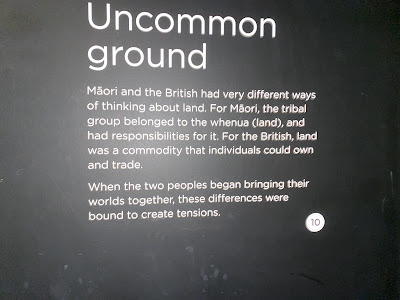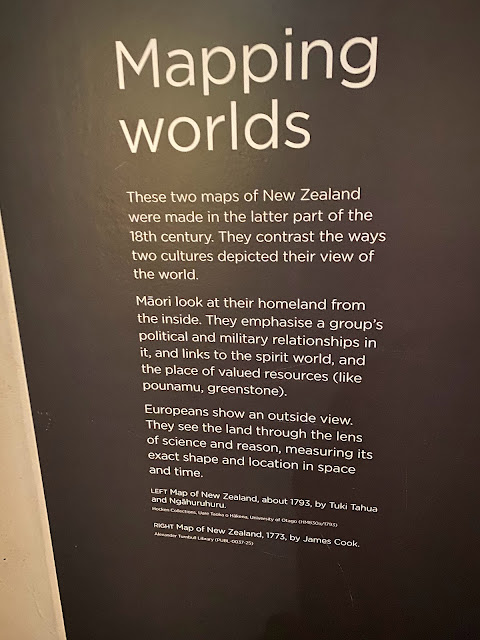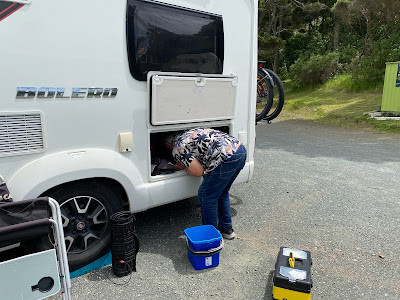We stayed one night at Paihia Top 10, not having realised when we booked it by phone, that it was a bit of an uphill, down dale walk to town. So once there, we just stayed put and blobbed once all infrastructure work was done.
It was a lovely campground, but quite small - the sites were a reasonable size with enough space between them, but we were rear to rear with the people behind us. And the new managers were lovely and doing a really good job.
We moved on the next morning to Waitangi Holiday Park - still in Paihia, but very close to the causeway bridge over to the Treaty Grounds. This camp is quite different to the Paihia Top 10 - wide open spaces and expansive sites.
One of the key reasons for coming up here was to visit and explore in depth the Treaty Grounds and it has been extremely emotional for us.
Waitangi is where the Treaty of Waitangi was signed on 6 Feb,1840. And while it is one of the few treaties with indigenous people ever developed by the British as they colonised huge parts of the world, and while it is lauded for that, it has not been honoured as it should have been either by the Crown or by successive NZ governments (or incidentally by pakeha NZers in the main) - in the 19th century land was confiscated as punishment for resistance (either peaceful or with armed fighting) to having land taken - figure that one out!
The disenfranchisement resulted in loss of income from the land and inter-generational poverty ensued, with concomitant poor health and education outcomes, lower age at death, and Māori being far more likely to be charged with crimes than pakeha caught doing the same thing and to receive longer, harsher sentences.
The government which has just been voted out, i.e. the Labour government, was working hard to redress the balance - to improve outcomes for Māori in health, in education, in employment and justice, to reduce child poverty and improve housing. Previous governments, both Labour and National had worked on redress, Labour with more intentionality than National, to be fair.
However this will not be the case with the government which has just been voted in - a coalition of chaos with 3 parties (National Act and NZ First) the leaders of the first two of which publicly stated respectively that they (National) would a) work with the third one if they had to, and b) they (Act) would not sit around a Cabinet table with him (NZF Leader) - and yet here they all are. Such is the draw of power for all three of them.
The Act leader has race-baited and dog whistled his way into being a
coalition partner, working on pakeha (white) fears that Māori being
given a fair go means they lose something themselves. Pakeha definitely don't lose
anything but they rather like the feeling of being a higher caste - I
reckon they don't want equality or equity because they fear that they
will be diminished. AAARRRGGGHHH!!!
Anyway, as I was saying, the government which has just been voted in (how I don't know - it has me doubting the sanity of NZers frankly) have stated that they are going to:
- require government departments to remove the Māori names of them and only communicate in English rather than using Māori greetings
- all three of the coalition partners want to limit the use of Te Reo (the language - which, by the way, was declared to be an official language of NZ by a former National government)
- introduce a Treaty Principles Bill into Parliament as negotiated by the leader of the right wing Act party - he wanted a referendum on the principles, and this bill being on the list is a sop to him, a halfway house with the possibility of a referendum if he can get the agreement of a certain number of MPs.
- the intent is to determine which version of the Treaty of Waitangi should be adhered to moving forward: as a) it was written in English and only signed by 39 chieftains or b) the one written in Māori (Te Tiriti o Waitangi) and signed by 501 chieftains. Seems obvious to me that it should be the one signed by an overwhelming number: 13 times as many, in fact.
- There are differences in the meanings of words which were used purportedly as literal translations. But given Māori's relationship with the land means the land owns them (whenua means land and also placenta, and Papatuanuku is the Earth Mother with all tangata [people] as her children) and they have guardianship of it (kaitiakitanga) as a community; and given the British relationship with the land is that land belongs to the Crown and the Crown can bestow title to it and it can be sold and divided and inherited, it was inevitable that conflicts would arise and the Treaty would not be adhered to.
- Sovereignty in English means something different than rangatiratanga does in Māori
- And Māori viewed the Treaty as Queen Victoria taking responsibility for governing the settlers who were pretty unruly and out of control, not them. The word kawanatanga was developed (kawana=governor) as governorship to cover that concept
- So getting the principles interpreted with a pakeha point of view is what the leader of the Act party is after - to limit Māori rights and limit the government's obligations and keep Māori as second class citizens. He talks about it as being equal rights for all NZers, but without affirmative action to lift the tail, equality is a myth. AAARRRGGGHHH!!! And he labels any affirmative action or initiatives to redress imbalance and inequality as apartheid. Double AAARRRGGGHHH!!!
- Here is an opinion piece by the former mayor of Kapiti
for your information - because he states it more cogently than I can,
about the impacts of the different understandings of language - sort of
like there being lots of words for snow in one of the Scandinavian
languages, while we have one ... Anyway, do read it - I found it useful.
- And Read Anne Salmond for a more articulate and less impassioned discussion of why a referendum about the Treaty principles would be a mistake. The points she makes are relevant for the Treaty Principles Bill too because while the bill will go through a parliamentary process, it will fuel a lot of debate and division in the public. I expect quite a big measure of protest and counter-protest by the public. David and I will be protesting, that's for sure!
So all of the above is an explanation of why being at Waitangi and seeing what could be lost with this wagonload of wankers in power was pretty difficult and very distressing for us.
The rest of the post is photos so that I don't burden you with more of my ranting ...
 |
| A kingfisher posed patiently... |
On our first day at Waitangi, we attended a Māori show: poi, singing, action songs, stick games to develop wrist and arm strength and dexterity for use of the mere (club), taiaha (a long fighting stick with a sharpened end and a flat blade at the other) the uses of which were also displayed for us. Although we have both seen these before in work contexts, this was all very moving. We also had a guided tour of the Treaty grounds with explanations of the significance and history of what took place, what preceded it and some of what has occurred since. My impression was that the tour guide, Ceci, did her best to be impartial, give the benefit of the doubt to, and not very judgemental of, the transgressions of the European settlers/whalers and the British colonisers. She handled a lot of the most significant stuff with a light touch and I think she intended to leave the museums to show a more accurate and realistic view of what occurred after the Treaty was signed, and how discrepant the views of its meaning were. And of course, the colonisers had never considered the rights of any other indigenous people - colonising was what they did and took for granted that they had a god-given right to take what they wanted.
On the second day, we visited the museums both of which were very moving.
 |
| The seven pillars of principle - all cultures have them: defining but different |
In one of the bullet points above I referred to the differences in how Māori and Europeans/British related to land. The next three photos are of display boards that explain it far better than I can. It is interesting to note, by the way, that almost all indigenous peoples consider themselves as guardians of the land, that they belong to the land, rather than that the land belongs to them as Western societies believe is the case.
 |
There is real danger in assuming how an unknown people will respond to approaches or assuming that your way is the right way... The trumpet used by Europeans approaching in their ships was seen as an aggressive response to the conch shell calls from Māori, rather than a show of equal noise. Customarily Māori would respond to that call showing they were coming in peace... It was an easy mistake for the Europeans to make but a fundamental one.
This next text shows another aspect of how differently each culture saw their worlds. Of course, Māori only drew the maps because the English requested them to. And I do object strongly to the last sentence including the word 'reason' - that is such a culturally subjective concept and it's thoughtless here, in my view!
 | |
Prior to Te Tiriti o Waitangi, a number of Māori chieftains quickly realised they were in danger of losing their sovereignty given the large number of people coming to the country. So they signed a declaration of independence and sent a copy to the King.
There was cycnicism, concern and mistrust about the efficacy and commitment to the Treaty very early on. And the different interpretations are obvious in these texts. As well, there is a strength of purpose about the principles as written in Te Reo Māori.
In school, I remember learning about Hone Heke - with a different interpretation though - that he was a rebel, rather than a resistor of transgressions against the Treaty, and resisting the loss of income and the change from the Te Kara flag to the British one.
 |
| Prior to the last time the flagstaff was felled it had been sheathed for its first 20 feet in iron - didn't stop Hone Heke's men ... |
For over a century Maori petitioned Parliament and the Crown about the transgressions occurring against the TReaty - loss of land, valuable arable land being usurped and Maori being disenfranchised.
In 1940, at the Treaty centennial, Sir Apirana Ngata declared that if Māori joined up and fought the Germans alongside pakeha, then surely they would be granted full citizenship rights - part of the Treaty had been that Māori were granted citizenhip, but the rights accruing to them we not the same as those granted to immigrants. For example, during the Depression while pakeha men received 12/- a week of public assistance, Māori men received 9/- a week.
 |
| Sir Apirana Ngata's words at the centenary |
Over the intervening years and even after WWII where the Māori Battalion fought with extreme courage (and like the black US soldiers) were often given more dangerous assignments than their white counterparts, the returning Maori soldiers were not entitled to the land grants that pakeha soldiers got, mortgages were not made available to them, job opportunities were not on offer.
In 1975, after years of discontent, Whina Cooper decided to lead a hikoi of protest to Parliament - she walked with a growing group of people from marae to marae from Te Tai Tokerau (Northland) to Parliament in Wellington.
 |
| During the hikoi this pou was carried all the way and it never touched the ground until it arrived there. It was a privilege to be its bearer. |
 |
| This is quite hard to read, sorry. |
There was a display of people's thinking about the Treaty.
 |
| Seems sensible to me! |
There was a section that outlined the transgressions in various areas of New Zealand. This one was relevant to me because I grew up in Taranaki and we had our children in Whanganui.
The Kingitanga movement which started in the 1850s in the Waikato and King Country is explained below:
 |
| The government had no intention of stopping the land grab. |
As we walked back to the Holiday Camp, it was hard to let go of the awe we felt. The trees in flower grounded us.
 | |
| The pohutukawa are starting to bloom up here. |
 |
| I don't know what this tree is but it looked stunning. |
I think you can tell by the contents of this post and all the photos that I took and have included here, I found this whole experience extremely moving, and given the sense of dread I have about this damn government (vanguard of vultures, legion of leprous losers, wagonload of wankers...) I have faith in the strength of Māori and the pakeha who are not racist and who want real equity.
I reckon we will prevail. But look for me on the protest lines, OK?









































